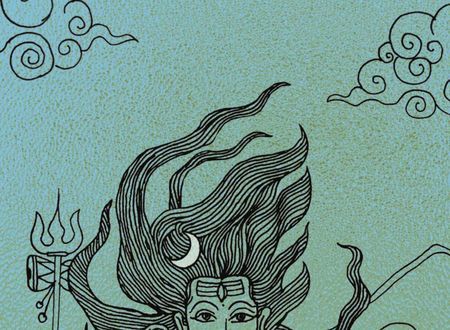It was May 1986, I was six and a half years old and had just got into grade two in my school. It was so boring. All periods were held by the same teacher in my class. Everyday, for all the subjects, whatever we did in the school, I had to go home and repeat it. This was the homework. Every single day. If I did five sums of maths and wrote four sentences in English, I had to go home and rewrite the exact same thing, for example.
I followed it for a couple of weeks before losing interest. Feeling I was cleverer than my teacher, I thought there was no sense in following her instructions. After all, the only difference between what I did in the class versus what I wrote at home was C.W. (classwork) and H.W. (homework). On the left corner of my notebook, if I could change C.W. to H.W. that would become homework.
After this profound realization, I figured I didn’t have to study at home. As soon as I would reach home, I would open my notebook, erase C and write H. Homework done. Whenever my parents enquired if I had finished my homework, I would just nod a confident head and flash my notebook. This worked really well for about a month. And then the inevitable happened.
“Submit your notebooks for checking,” my teacher announced to the class.
I tried to avoid but it was a small class. I told her that I forgot it at home and that I would bring it the next day. I’d hoped she might forget but she didn’t. She asked for my notebook again and I obliged.
“What is this?” she said, flipping through the pages. “This is all homework. Where is your classwork notebook?”
She thought I might have had two separate notebooks for class and homework.
“I forgot it at home,” I lied. “I’ll bring it tomorrow.”
I went back to my seat, both relieved and scared. The next day, I wasn’t sick, it didn’t rain buckets, no famous politician died, my tummy wasn’t hurting, my head was fine so I really had no excuse to not go to the school. I didn’t want to go but I had to.
“Where’s your notebook?” she asked me as soon as the class started, as if it wasn’t my notebook but her bonus cheque that she couldn’t wait to see.
I dilly-dallied and pretended that I was searching for it in my bag but she wasn’t having any of it.
“Come right here!” she ordered.
My heart was thumping. I walked up to her slowly and with my head hung low, I kept looking down at the floor. I could see some dust particles on the concrete floor, a tiny piece of chalk was stuck where two slabs joined.
“Where’s your notebook?” she yelled. Clearly, she was frustrated and irritated with me.
“I don’t have it.”
“What do you mean, you don’t have it?”
I told her what I had been doing the past one month, simply erasing the C of C.W. and replacing it with H. I was in the process of saying sorry, when, bang! and she whipped her hand across my face.
My world stood still, the surroundings disappeared.
It was a spectacular strike, a resounding slap that caught me completely off-guard. The left side of my face stung, burned. I had never been slapped and I had no clue that it hurt so much. There was pin drop silence in the class. Standing there, I kept my head down, a feeling of shame smeared my glum face. I was the black sheep.
No matter how strong or rebellious a child may appear, however well he or she may seem to handle it, in truth, physical abuse totally destroys your self-esteem.
She wrote a long note in my diary saying how not only I was irresponsible and a liar but that I also cheated and never did my homework. (Turning C.W. to H.W. didn’t count as homework, apparently.) I was asked to get the note signed from my father.
A long day passed and I went home and I pleaded with my mother that if she, instead of my father, could sign the note. It would make things easy, I told her. But, she politely refused and said that when it came to my education, she would not like to hide the truth from my father. Anything else, she might have considered but not this.
“Simply tell him the whole truth,” my mother encouraged me.
Like a meek calf, I approached my father and shared what had transpired at the school. I told him that I had not been doing my homework and that I was sorry about it. I gave him the note to sign.
“Are you really sorry?” he asked, “You are not just saying it to avoid this talk, right?”
“I am actually sorry,” I murmured.
“Do you promise to not repeat it?” He looked at me softly, brought me closer to him, and caressed my head.
“Yes, papa.”
“I’ll sign this time,” he chastised me gently, “but please never cheat again. If sometimes, you don’t feel like doing your homework, it’s okay. You just tell me so. Cheating is not an option.”
I nodded. He didn’t give me a big lecture or taught me morality. That was the entire conversation.
“If you have a problem, you call me,” my father wrote back to my teacher, “but, you must never touch my child again. You are not to hit him. Ever.”
I went back to the school with my head held high. My teacher frowned at the reply, said nothing of it, and asked me to go back to my seat. My father’s support and words at the time weren’t just calming and balming, in fact, they became the seeds of truth and fearlessness in my life. I figured I could share my thoughts and mistakes with him. Knowing that he would try to understand and not punish me for my errors in judgement and actions became a great pillar of my strength.
When we are born, our first ideals are almost always our parents. No doubt that being a parent is perhaps the most difficult job in the world (way more than being a husband or a wife even). The fact remains that parents’ behavior — towards others, their offspring (and with each other) — is the single most important element that influences the core values in their children. Children observe.
I am not suggesting that parents should treat their children with kid-gloves at all times. (That can be just as detrimental to a healthy upbringing.) You’ve got to be firm when you ought to be. It’s just that a family where truth is encouraged, where there’s open communication, where children are not lectured for every act that is contrary to a parent’s preference, such a family is bound to enjoy great bonding and love. Children brought up in such families will grow up to be confident individuals. Such children make compassionate adults and great leaders.
A student prepared all night for a zoology test but when he appeared for it in the morning, the teacher had introduced a surprised format. There were many cages with birds in them. The enclosures were so covered so you could only see the feet of the birds. It was a viva he would do one on one.
“You are to tell me the name of the bird by looking at its feet,” the teacher announced.
The student was mad because he wasn’t expecting this at all. He failed the test miserably and quickly made way to leave the room.
“Wait!” the teacher hollered, “what is your name? I’ve to mark it.”
“You tell me buddy!” the student turned around, lifted his pants and shouted. “Look at my feet and guess my name!”
I don’t think we can entirely blame our children for their lack of interest in studies because our current education system is deeply flawed. It’s designed for an industrial world and not a creative one. It strives to turn you into an average thinker, so you may be useful to the average society. It fosters conformity not discovery. Your inventions, research and talents must adhere to its standards. More than eighty percent of the stuff I studied in school, I have never utilized in my real life. That’s a lot of wastage of time and energy. It’s no wonder then that increasingly we are more restless and distracted than ever before studying things we don’t want to, pursuing careers we don’t like, living lives we almost loathe.
Much of this can be avoided if children could get a pat at the back at the right time, an encouraging word from their teacher, a display of understanding from their parents, a bit of compassion, tiny bit of empathy. That’s all it takes to transform average minds into extraordinary thinkers. More than siblings, peers, friends, religion, two sets of people who make the most difference to a child’s life are parents and teachers. So much so, at times the roles are interchangeable.
As a parent, sometimes things may get extremely difficult and you may lash out and all that. I don’t want you to feel guilty. If children can make mistakes so can parents. Just have a big heart, admit your fault and go back to being loving.
You can’t make a point by shouting or lashing out. Ultimately, love is the only way to transform anyone. You can be firm and yet be loving. If you are willing to be loving and be patient, they’ll come around. Such is the power of love, and in my view, the essence of good parenting and upbringing. No other person can ever fill in the shoes of a loving parent.
Take it easy. Whatever mistake it may be, it’s not the end of the world. If you want your children to be truthful and fearless, create a conducive environment.
Be gentle. Be loving. For, what is born out of love can only be transformed with love.
On another note, I’m very pleased to announce my debut work of fiction — The Last Gambit. Brought out by HarperCollins, it’s the story of a young boy and his chess teacher. I hope you enjoy this read (available in paperback and Kindle). Here are the relevant links to get this book:
1. Flipkart :: Amazon India.
2. Amazon.com
Peace.
Swami
A GOOD STORY
There were four members in a household. Everybody, Somebody, Anybody and Nobody. A bill was overdue. Everybody thought Somebody would do it. Anybody could have done it but Nobody did it.
Don't leave empty-handed, consider contributing.It's a good thing to do today.









Comments & Discussion
23 COMMENTS
Please login to read members' comments and participate in the discussion.